Why Is the US So Silent on the Yen?.
While reading this article, it struck me that the financial world has really changed in the last few years.
To summarize, the article asks why the U.S. is allowing the Japanese to weaken the yen in light of a very large trade surplus in between the two countries in Japan’s favor for 2012, $58bn. The writer then reports the thoughts of Neil Mellor, a currency analyst at Bank of New York.
Mellor’s prime theory is that the U.S. wishes that Japan’s economy would begin growing again to add to total world demand and is willing to suffer a large trade deficit with Japan to do so. His secondary theory is that the Bank of Japan is merely following the Federal Reserve’s policy lead, so that American criticism of the BoJ’s actions would be hypocritical.
This is how the financial world has changed since the onset of the Great Financial Crisis. Analysts pored over the fundamentals to deliver research. Nowadays, analysis of the fundamentals has taken a backseat to whatever the central banks are doing. Look, the central banks do have more influence today than they did just a few years ago, but they do not have perfect control over the complex world financial system.
I have an answer to the question posed in the article, “Why is the U.S. so silent on the yen?” The answer is that Japan’s economic fundamentals warrant the recent slide in the currency. The price (exchange rate) of a currency is influenced by several factors, but the most important is the relationship between supply and demand. Note the trend in Japan’s current account balance. It’s been decreasing for sometime now and crossed into negative territory at the end of 2012:
There is no good news here. Imports have been increasing with the rising price of fuel imports one of the major culprits:
Meanwhile, exports have been decreasing. In particular, exports to China have been decreasing in line with Japan’s intensifying bellicose behavior in relation to some rocks just north of Taiwan. These rocks are not made of gold or oil-filled shale deposits. They are just mostly uninhabited rocks.
These charts tell us that the demand for yen is decreasing, and when the supply is held constant the price should decrease as well. This is very basic economic theory. Foreigners are not buying as many Japanese goods so they do not have to purchase as much yen. Contemporaneously, Japan is selling yen to raise dollars to pay for oil among other imports.
Above, I made the assumption that the supply of yen was being held constant, but it is not. The Bank of Japan has been steadily increasing the currency supply by printing yen to buy securities, mostly Japanese Government Bonds.
This chart is a little stale. Among other changes since October, the ECB has shrank its balance sheet while Japan’s continued to grow. The Bank of Japan now has the largest balance sheet in terms of assets to GDP among the Big 4.
The reason why the yen has been losing value is simply because the fundamentals demand it. Moreover, the trends I highlighted in this post will intensify over the coming months.
The weak yen may eventually lead to more Japanese exports in the long term, but in the short term imports will experience a shocking rise. The price of oil in yen has increased over 33% since the yen began its slide. This rise will have an adverse effect on consumer spending and growth overall.
The Japanese government budget is a disaster, and there are not enough buyers for JGBs so the Bank of Japan will continue to finance the government with the printing press.
There is a tipping point. A moment in time where people realize that Japan has entered a crisis precipitating a massive sell-off of everything Japanese, stocks, corporate bonds, government bonds, Hello Kitty…
As I wrote last week,
Japanese Crisis Endgame Has Begun | DARECONOMICS.
When the rate of inflation picks up, Investors will immediately require higher rates of interest to purchase Japanese bonds, and this whole house of cards will fall. I wish I knew when this will occur, so I could retire. The endgame is impossible to predict. It is in no one’s interest for Japan to fail, so the world central banks will come together and attempt a rescue. Eventually, the rescue will fail, but it will delay the denouement for quite some time, long enough for you to lose all your money betting against Japan.

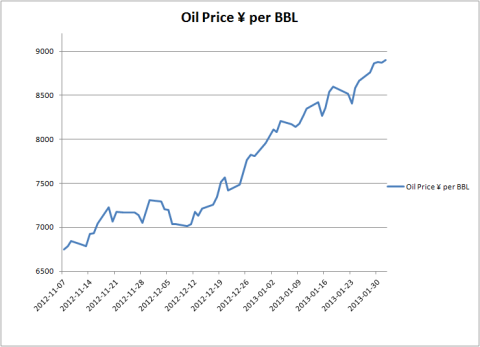
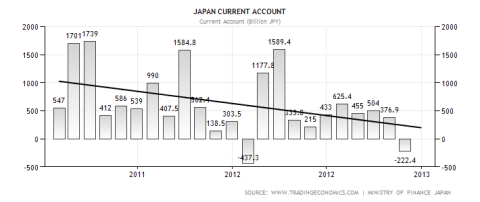
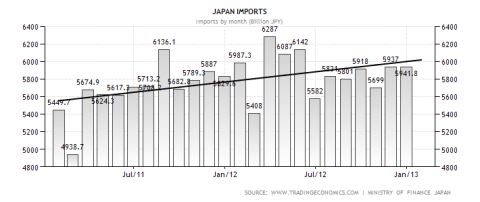
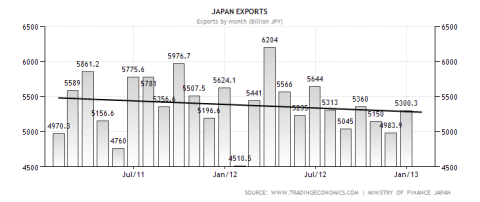
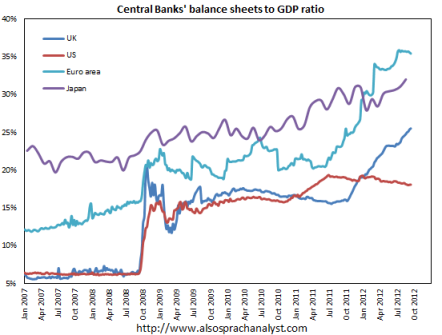
I appreciate your website. Thank you for your articles.
I have a few thoughts on Japan and US relations.
“Why is the U.S. so silent on the yen?”
Japan is buying US debt.
US needs a buyer of debt.
US does not need a seller of debt.
” Why does Japan buy US debt ? ”
They can exchange a worthless currency for a more sound currency.
They do not buy US debt with Gold ?
” So How does Japan buy US debt ? ”
With what many may say is a bankrupt currency ?
Fukishima has all but bankrupted a nation that was effectively bankrupt previously.
” Why on earth would the US sell their debt to Japan and accept a worthless exchange ? ”
Japan is buying US debt.
US needs a buyer of debt.
US does not need a seller of debt.
Round Robin.
The facade charade continues.